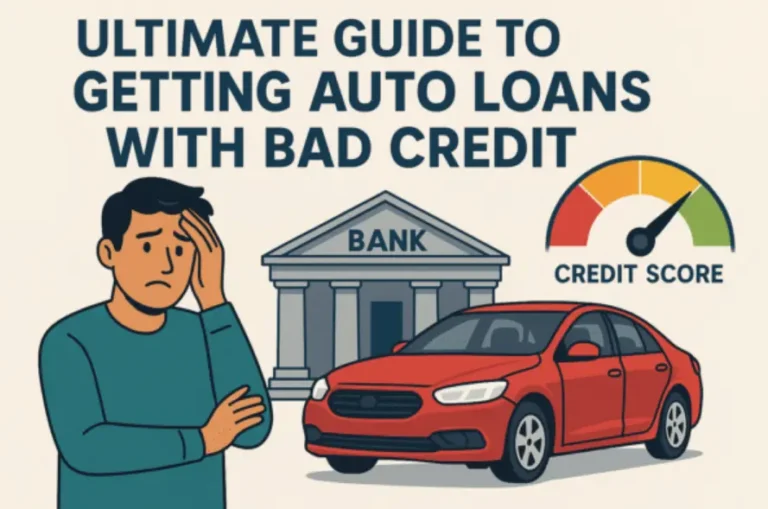How to Secure a Business Loan with Bad Credit: Ultimate Guide to Funding Options and Strategies

Running a business is tough enough without bad credit holding you back. Maybe you missed a few payments during a rough patch, or your startup hit some financial bumps. Whatever the reason, bad credit can feel like a brick wall when you’re trying to get a business loan. The good news? It’s not game over. You can secure funding, even with a less-than-perfect credit score.
In this guide, we’ll walk you through everything you need to know about how to secure a business loan with bad credit. From understanding what bad credit means to exploring loan options, applying smart strategies, and even improving your credit for the future, we’ve got you covered. Let’s dive in and turn that financial frown upside down!
Understanding Bad Credit and Its Impact
What is Bad Credit?
Bad credit happens when your credit score dips below a certain threshold, signaling to lenders that you might be a risky bet. In the U.S., a FICO score below 580 is typically considered bad credit, while scores between 580 and 669 are “fair.” For businesses, credit scores often come from agencies like Dun & Bradstreet or Experian.
A common misconception? Bad credit means you’re irresponsible. Not true! Life happens—maybe a client didn’t pay on time, or an unexpected expense tanked your cash flow. Understanding this helps you approach lenders with confidence. If you’re exploring more options, check out TraceLoans for helpful solutions on securing a business loan even with bad credit.”
Why Might Your Business Have Bad Credit?
Bad credit doesn’t just appear out of nowhere. Common culprits include:
- Missed or late payments on loans or bills.
- High debt levels compared to your revenue.
- County Court Judgments (CCJs) or legal actions against your business.
For example, let’s say Sarah, a bakery owner, took out a loan to expand her shop. A slow season meant she missed a few payments, and her credit score took a hit. Serious issues like CCJs can make things trickier, as they signal deeper financial trouble to lenders.
How Bad Credit Affects Loan Approvals
Bad credit doesn’t mean you’re shut out, but it does make borrowing tougher. Lenders see low scores as a red flag, so they often:
- Charge higher interest rates to offset risk.
- Impose stricter terms, like shorter repayment periods.
- Require collateral or a personal guarantee.
Think of it like trying to rent an apartment with a spotty rental history—you might get approved, but the landlord might ask for a bigger deposit. Lenders use credit scores to gauge how likely you are to repay, so a low score means they’ll hedge their bets.
How to Check Your Business and Personal Credit Score?
Knowledge is power. Before applying for a loan, check your credit scores to know where you stand. Here’s how:
- Personal credit: Use free services like Credit Karma or Experian to view your FICO score.
- Business credit: Check with Dun & Bradstreet, Equifax, or Experian Business for reports.
Pro tip: Your credit often matters for small businesses, especially startups. Lenders may look at both to assess risk. For example, John, a freelance designer, was surprised to learn his personal late credit card payments hurt his business loan application.
Can You Get a Business Loan with Bad Credit?
Yes, you can get a business loan with bad credit—it’s just about finding the right lender and approach. Let’s break down what lenders look at and how you can improve your odds.
Key Factors Lenders Consider
Lenders don’t just obsess over your credit score. They also evaluate:
- Personal and business credit scores: Both matter, especially for small businesses.
- Business financial history: Revenue, profit, and cash flow show your ability to repay.
- Assets: Equipment or property can serve as collateral.
- Time in business: Most lenders prefer at least 6–12 months of operation.
For instance, a lender might overlook a low credit score if your business has strong monthly revenue. It’s like convincing a friend to lend you money by showing you’ve got a steady paycheck.
Personal Guarantees and Guarantors
Ever heard of a personal guarantee? It’s when you promise to repay the loan personally if your business can’t. This is common for bad credit loans, as it lowers the lender’s risk. A guarantor is similar but involves someone else (like a business partner) vouching for you.
Imagine you’re borrowing money from your uncle. He might say, “I’ll lend you $5,000, but your mom has to promise to pay me back if you don’t.” That’s a guarantor in action.
Eligibility Criteria for Bad Credit Loans
Most lenders have basic requirements, even for bad credit loans:
- Minimum monthly revenue (e.g., $10,000).
- At least 6 months in business.
- A valid business bank account.
Some lenders, like alternative or online lenders, are more flexible than traditional banks. Check out SBA loans for government-backed options with looser criteria.
Types of Business Loans for Bad Credit
Not all loans are created equal. Here’s a rundown of the best options for businesses with bad credit.
Unsecured Business Loans
These loans don’t require collateral, making them easier to get but riskier for lenders. Expect higher interest rates. They’re great for businesses without valuable assets.
Secured Business Loans
Got equipment or property? A secured loan uses these as collateral, which can lower interest rates. Just be warned: if you default, the lender can seize your assets.
Merchant Cash Advances
Perfect for businesses with steady credit card sales, a merchant cash advance gives you cash upfront in exchange for a percentage of future sales. It’s fast but expensive, with high fees.
Business Credit Cards and Lines of Credit
A business credit card or line of credit offers flexible funding for smaller expenses. They’re easier to qualify for than traditional loans and can help rebuild credit if used responsibly.
SBA Microloans and Short-Term Loans
SBA microloans (up to $50,000) are backed by the U.S. Small Business Administration and often have lenient credit requirements. Short-term loans are another option, with quick approvals but higher rates.
Invoice Financing and Asset Finance
Invoice financing lets you borrow against unpaid invoices, great for cash flow gaps. Asset finance funds equipment purchases, using the equipment itself as collateral.
Other Funding Options for Businesses with Bad Credit
Loans aren’t your only option. Here are some alternatives to explore.
Government Grants
Grants are like free money—you don’t have to repay them. Check Grants.gov for federal options or local small business programs. They’re competitive, so apply early.
Equity Crowdfunding
With equity crowdfunding, you raise money by selling small shares of your business to investors online. Platforms like SeedInvest make it accessible, but you’ll give up some ownership.
Start-Up Loans and Guarantor Loans
Start-up loans from programs like the SBA or private lenders cater to new businesses. Guarantor loans involve a third party backing your loan, boosting approval odds.
Strategies to Secure a Bad Credit Business Loan
Ready to boost your chances? Try these proven strategies.
Start with Small Loans
Don’t aim for a $500,000 loan right away. Smaller loans (e.g., $10,000) are easier to get and help build lender trust. Think of it like starting with a 5K race before a marathon.
Work with Alternative or Specialist Lenders
Traditional banks are picky, but alternative lenders like Kabbage or OnDeck specialize in bad credit loans. They focus on revenue and potential, not just credit scores.
Offer Collateral or a Co-Signer
Collateral (like equipment) or a co-signer with good credit can make lenders say “yes” faster. It’s like having a trusted friend vouch for you.
Prepare a Strong Loan Application
A solid application is your golden ticket. Include:
- A detailed business plan showing how you’ll use the funds.
- Financial statements (e.g., profit and loss).
- A clear explanation of your credit issues and how you’re addressing them.
For example, Maria, a boutique owner, got approved by being upfront about a past bankruptcy and showing strong recent sales.
Advantages and Disadvantages of Bad Credit Business Loans
Weighing your options? Here’s the good and the bad.
Pros
- Access to funding: Get cash to grow or cover emergencies, even with bad credit.
- Business growth: Use funds to buy inventory, hire staff, or expand.
Cons
- Higher costs: Interest rates can hit 20% or more.
- Risk: Defaulting could mean losing collateral or personal assets.
How to Apply for a Bad Credit Business Loan
Applying doesn’t have to be scary. Follow these steps.
Step-by-Step Application Process
- Research lenders: Compare rates and terms from banks, online lenders, and SBA programs.
- Gather documents: You’ll need financial statements, tax returns, and a business plan.
- Submit your application: Apply online or in-person, depending on the lender.
- Follow up: Check in if you don’t hear back within a week.
Tips for a Successful Application
- Be honest: Explain your credit issues upfront to build trust.
- Highlight strengths: Show off strong revenue or loyal customers.
- Shop around: Don’t settle for the first offer—compare at least three lenders.
Improving Your Business Credit Score for Future Loans
Bad credit isn’t forever. Here’s how to turn things around.
Practical Steps to Boost Your Credit
- Pay bills on time: Set reminders or automate payments.
- Reduce debt: Pay down high-interest loans or credit cards.
- Monitor credit reports: Dispute errors with agencies like Experian.
For example, Tom, a contractor, boosted his score by 100 points in a year by paying off a credit card and disputing an incorrect late payment.
Long-Term Benefits of Credit Repair
A better credit score means:
- Lower interest rates on future loans.
- More lender options, including big banks.
- Increased trust from suppliers and partners.
Frequently Asked Questions
What are bad credit business loans?
They’re loans designed for businesses with low credit scores, often with higher interest rates but more flexible approval criteria.
How much can I borrow with bad credit?
It depends on the lender and your revenue, but amounts typically range from $5,000 to $250,000.
Do bad credit loans require a credit check?
Most do, but some alternative lenders focus on revenue or collateral instead. Always ask upfront.
Are there HRs there alternatives to bad credit loans?
Yes! Options like government grants, equity crowdfunding, or invoice financing can provide funding without strict credit requirements.
Conclusion
Securing a business loan with bad credit is challenging but far from impossible. By understanding your credit, exploring loan options like unsecured loans or SBA microloans, and using smart strategies like collateral or a strong application, you can get the funding you need. Plus, taking steps to improve your credit now will open even more doors down the road.






